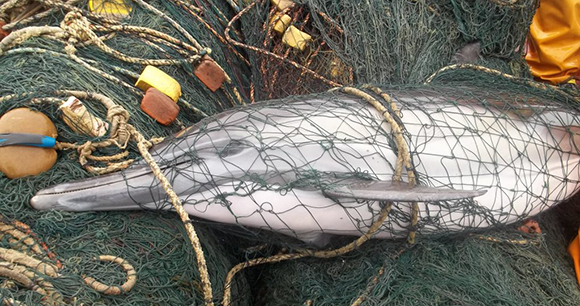
Embargo Will Push Nations to Stop Marine Mammal Bycatch
Washington, DC—The National Marine Fisheries Service (NMFS) determined today that 42 nations may not export certain seafood products to the United States because fishers in these countries catch marine mammals in violation of US standards. The agency found that the nations failed to adopt bycatch prevention measures that are comparable to what US fishers must follow under the Marine Mammal Protection Act (MMPA). The seafood bans will take effect in January 2026.
“This is a lifesaving victory for whales and dolphins swimming in the waters of Mexico, Vietnam, and other nations,” said Sarah Uhlemann, international program director at the Center for Biological Diversity. “These conservation sanctions will mean fewer beloved marine mammals will get caught and killed in fishing gear. I only wish the US government had gone further, since many other nations also need to do a better job avoiding bycatch.”
Nations facing seafood bans include Mexico, China, Ecuador, Indonesia, Nigeria, and Turkey. Regarding Mexico, NMFS found that the nation failed to track or limit marine mammal bycatch—even for imperiled animals—as is required in the United States. Other nations, such as Benin, were denied because they failed to apply to continue exporting seafood to the United States. A 2023 report by conservation groups found that many other nations fail to meet US bycatch standards and should face bans, including the United Kingdom, Ecuador, and South Africa.
“If you want to sell your seafood in the United States, it is only fair that you live up to the same strict marine mammal protections that other fishermen abide by. And if you can't do that, you shouldn't have a market here, or anywhere else for that matter,” said Zak Smith, a senior attorney at NRDC (Natural Resources Defense Council). “The promise of the Marine Mammal Protection Act is that seafood sold in the United States comes only from commercial fisheries that do not kill or seriously injure marine mammals. US consumers and fishermen deserve nothing less and today’s action brings us closer to that promise.”
Since 1972, the MMPA has prohibited the United States from allowing foreign seafood to enter the country unless exporting nations meet the same standards applied to US fishers for limiting marine mammal bycatch. But NMFS ignored the directive for decades, until conservation groups—the Animal Welfare Institute, Center for Biological Diversity, and NRDC (Natural Resources Defense Council)—petitioned and eventually sued to compel action. This culminated in an agreement that set a deadline for today’s decision.
Bycatch is the greatest conservation threat to marine mammal populations worldwide. Each year, more than 650,000 whales, dolphins and other marine mammals are caught and killed in fishing gear around the globe. These animals are unintentional “bycatch” of commercial fisheries and either drown or are tossed overboard to die from their injuries.
“It is high time that the United States implement this important provision of the law and penalize countries that harm so many marine mammals,” said Georgia Hancock, director and senior attorney of the Animal Welfare Institute’s Marine Wildlife Program. “Marine mammals contribute immense value on a global scale—ecological, economical, and cultural—and killing them by these cruel methods must have serious consequences.”
Some of the deadliest types of fishing gear include gillnets, longlines, trawls, pots, and traps, according to NMFS. Yet numerous nations continue to use this gear without even tracking the number of marine mammals killed.
The United States is the world’s largest seafood importer, bringing in more than $26.6 billion in seafood products in 2024 from more than 140 nations. An estimated 80% of seafood consumed in the United States is imported, including shrimp, tuna, and other fish.
Marjorie Fishman, Animal Welfare Institute
[email protected], (202) 446-2128
Sarah Uhlemann, Center for Biological Diversity
[email protected], (206) 327-2344
Andrew Scibetta, NRDC
[email protected], (202) 289-2421
The Animal Welfare Institute (awionline.org) is a nonprofit charitable organization founded in 1951 and dedicated to alleviating animal suffering caused by people. We seek to improve the welfare of animals everywhere: in agriculture, in commerce, in our homes and communities, in research, and in the wild. Follow us on Facebook, Instagram, Threads, Bluesky, and LinkedIn for updates and other important animal protection news.
The Center for Biological Diversity is a national, nonprofit conservation organization with more than 1.8 million members and online activists dedicated to the protection of endangered species and wild places.
NRDC (Natural Resources Defense Council) is an international nonprofit environmental organization with more than 3 million members and online activists. Established in 1970, NRDC uses science, policy, law and people power to confront the climate crisis, protect public health and safeguard nature. NRDC has offices in New York City, Washington, DC, Los Angeles, San Francisco, Chicago, Beijing, and Delhi (an office of NRDC India Pvt. Ltd).